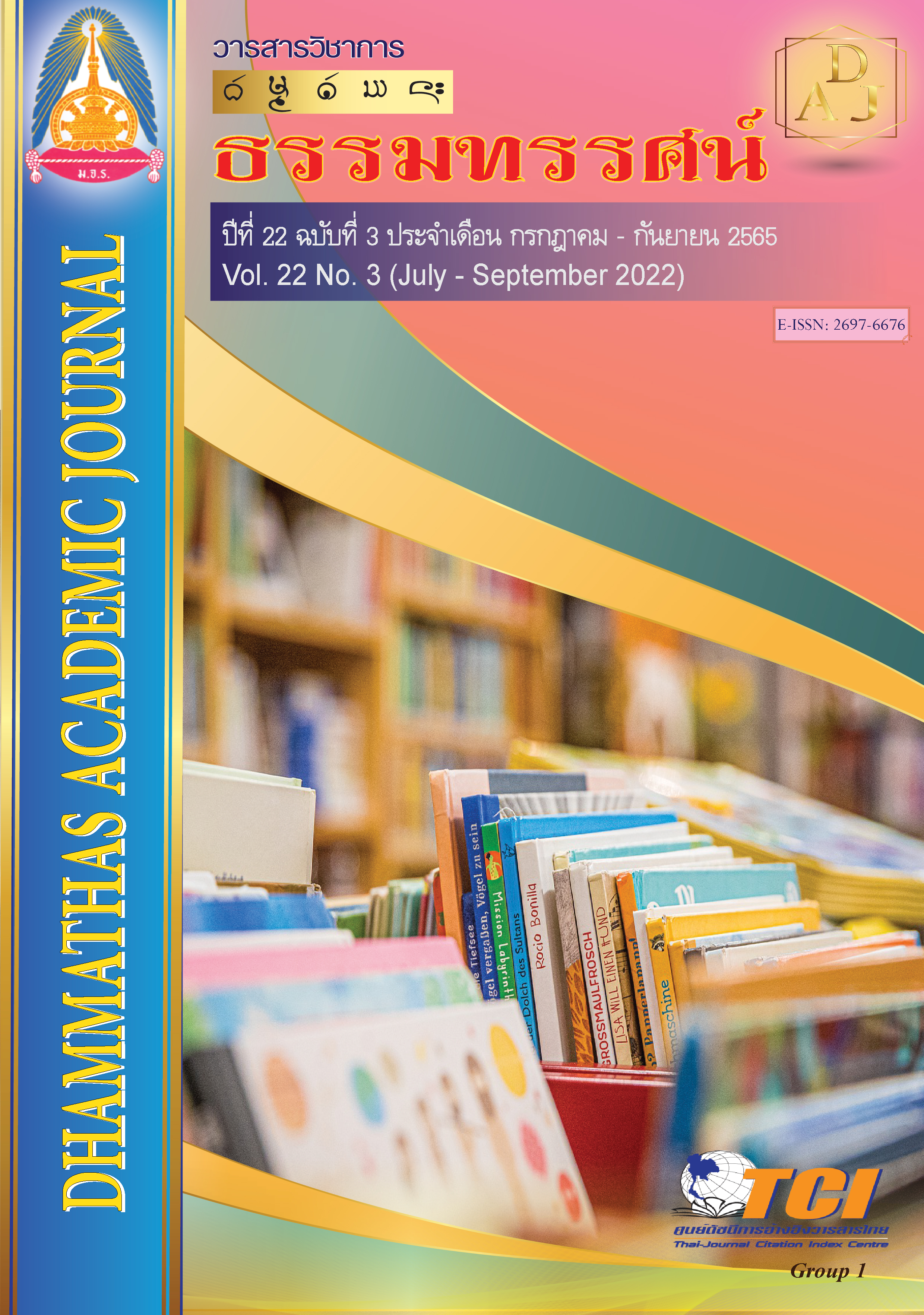A Model of Human Development with the Buddhist Ethics
Main Article Content
Abstract
The objectives of this research articles were: 1) to study human development; 2) to study human development according to Buddhist ethics; 3) to analyze human development model according to Buddhist ethics. This study was carried out by means of documentary research by collecting data from primary and secondary sources before the obtained data were interpreted by Descriptive Analysis according to the inductive method.
The research results were as follows:
1. Human development is to make human beings to live in the right way of life. Human beings have an animal nature that can be trained to develop themselves. Buddhism puts human beings as the center of development to enable human beings to live within the framework of moral ethics in every aspect.
2. Buddhist ethics in human development is the standard of human behavior from the basic to the middle level, and to the high level, so that human beings can lead a virtuous life according to the ideals that human beings can achieve for perfect humanity.
3. Human development model according to the Tisikkhā principles is the stage of full human development to develop human beings to become a complete human being in 3 areas. 1) Behavioral development (Adhisīlasikkhā) according to the Magga including Sammāvācā, Sammākammanta and Sammāājīva. This is a support that makes the person ready to build the foundation of the mind to have better quality. 2) Mental human development. (Adhicittasikkhā) according to the Magga that arises again: Sammāvāyāma, Sammāsati and Sammāsamādhi to make the practitioner's mind complete with virtue as the base of intellectual development; 3) Intellectual human development (Adhipaññāsikkhā) according to the Magga: Sammādiṭṭhi and Sammāsaṅkappa to make practitioners ready in wisdom that can live with stable and sustainable wisdom.
Article Details

This work is licensed under a Creative Commons Attribution-NonCommercial-NoDerivatives 4.0 International License.
เพื่อให้เป็นไปตามกฎหมายลิขสิทธิ์ ผู้นิพนธ์ทุกท่านต้องลงลายมือชื่อในแบบฟอร์มใบมอบลิขสิทธิ์บทความ ให้แก่วารสารฯ พร้อมกับบทความต้นฉบับที่ได้แก้ไขครั้งสุดท้าย นอกจากนี้ ผู้นิพนธ์ทุกท่านต้องยืนยันว่าบทความ ต้นฉบับที่ส่งมาตีพิมพ์นั้น ได้ส่งมาตีพิมพ์เฉพาะในวารสาร วิชาการธรรม ทรรศน์ เพียงแห่งเดียวเท่านั้น หากมีการใช้ ภาพหรือตารางของผู้นิพนธ์อื่นที่ปรากฏในสิ่งตีพิมพ์อื่นมาแล้ว ผู้นิพนธ์ต้องขออนุญาตเจ้าของลิขสิทธิ์ก่อน พร้อมทั้ง แสดงหนังสือที่ได้รับการยินยอมต่อบรรณาธิการ ก่อนที่บทความจะได้รับการตีพิมพ์References
ไกรวุฒิ มะโนรัตน์ และสุเทพ พรมเลิศ. (2559). “วิเคราะห์การพัฒนามนุษย์ตามหลักพุทธธรรม”, รายงานการวิจัย. คณะพุทธศาสตร์ : มหาวิทยาลัยมหาจุฬาลงกรณราชวิทยาลัย.
จักรพรรณ วงศ์พรพวัณ. (2560). “ศึกษาวิเคราะห์การพัฒนาปัญญาตามแนวพุทธจริยศาสตร์ของสำนักปฏิบัติธรรมในจังหวัดขอนแก่น”, รายงานการวิจัย. ขอนแก่น : มหาวิทยาลัยมหาจุฬาลงกรณราชวิทยาลัย.
พระวิทยา ณาณสาโร. (2554). “การศึกษาแนวคิดเศรษฐกิจพอเพียงที่สอดคล้องกับหลักพุทธธรรมที่ปรากฏในคัมภีร์พระพุทธศาสนาเถรวาท", วิทยานิพนธ์พุทธศาสตรมหาบัณฑิต. บัณฑิตวิทยาลัย : มหาวิทยาลัยมหาจุฬาลงกรณราชวิทยาลัย.
ภาวิณี ภาพันธ์. (2561). “การพัฒนาศักยภาพมนุษย์ตามหลักจักร 4”, สารนิพนธ์พุทธศาสตรดุษฎีบัณฑิต. บัณฑิตวิทยาลัย : มหาวิทยาลัยมหาจุฬาลงกรณราชวิทยาลัย.
มหาจุฬาลงกรณราชวิทยาลัย. (2539). พระไตรปฎกภาษาไทย ฉบับมหาจุฬาลงกรณราชวิทยาลัย. กรุงเทพมหานคร : โรงพิมพมหาจุฬาลงกรณราชวิทยาลัย.

